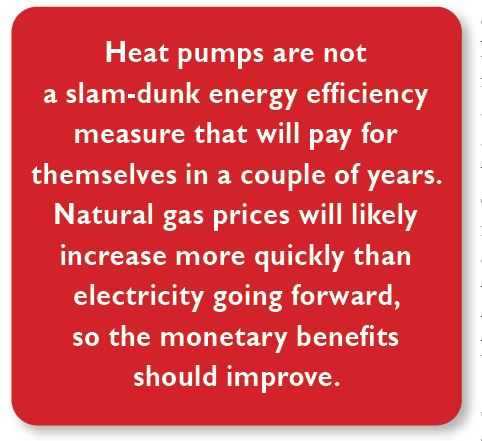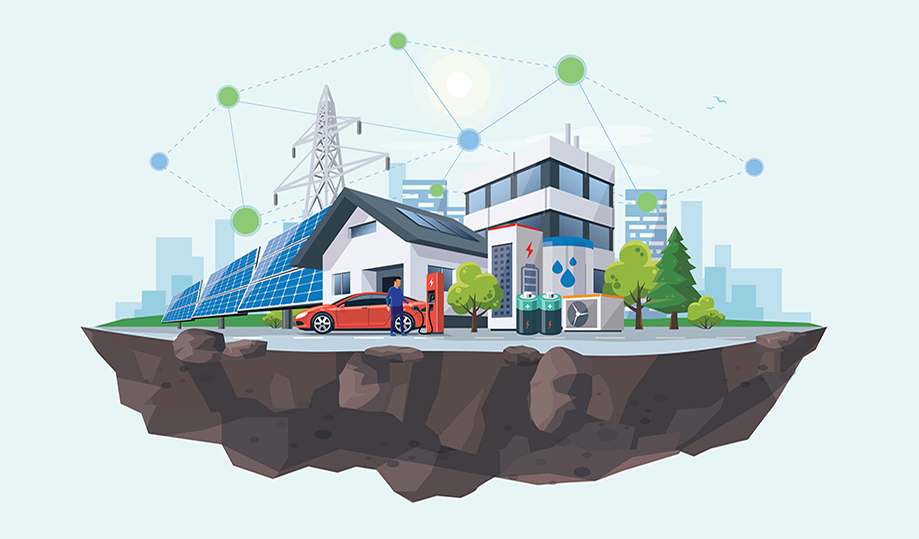Utility Influences on High-Performance HVAC/Electrification
There is a growing trend in some areas of the U.S. to “electrify” homes by getting rid of gas appliances and replacing them with high-efficiency electric alternatives. These efforts tend to be concentrated in the same areas where climate change concerns are top of mind, and that’s no coincidence. These are the same areas where decades of accommodative policy have allowed cleaner sources of electricity to outpace fossil fuels like natural gas, coal, and oil for electricity production.

This grid cleanup has made it possible for buildings to reduce their carbon footprint by switching from combustion to electricity for cooking, water heating, and space heating. Policymakers in these areas have recognized this and are making a big push for building electrification, especially in homes.
At face value, encouraging the switch to electricity seems like a no-brainer to policymakers trying to figure out how to curb emissions. With efficient electric technologies, homes in areas with a relatively clean grid can produce fewer emissions using electricity than by burning gas to heat their home, water, and food.
Changes are A-Coming

As the grid shifts toward renewables like solar and wind, the benefits become even more significant. However, there is more to the story that isn’t at the forefront of these policy decisions. Let’s take a close look at some tough questions. We’ll focus on HVAC electrification and heat pumps for space heating. We’ll cover how you — as a contractor — can help customers who want to switch to navigate the potential pitfalls.
How Will Switching Impact Customer Bills? Isn’t Electricity Expensive?
Nationwide, electricity is more expensive than gas per unit of energy from the meter. This price discrepancy is largely offset because heat pumps are about three times as efficient as furnaces. Heat pumps produce more heat with less energy.
On average, the energy costs for heating with a heat pump versus with a gas furnace are about the same. In some areas, folks will save a little money. In other areas, they’ll end up paying more with a heat pump. That will depend on electricity, gas prices, the climate, the construction of their home, and other nuances.
Heat pumps are not a slam-dunk energy efficiency measure that will pay for themselves in a couple of years. Natural gas prices will likely increase more quickly than electricity going forward, so the monetary benefits should improve. That said, most customers wanting to switch to a heat pump will do it for other reasons. Some include the environmental benefits of electrification or the opportunity to gain air conditioning if they didn’t have it before.
When discussing a potential electrification job with a customer, be sure you have your message right. Don’t overpromise on utility bill savings.
Click Below for the Next Page:













Ben,
Thanks for a great article on a complex topic. You covered the subject from many angles allowing for more than one view. Keep this kind of article coming.
Wouldn’t it be great if we had a very accurate, repeatable way to describe a home’s heat loss in BTUs at Design Temperature? That would guarantee happy homeowners and a ton of referral business.
Wake up. Most electrical grids are almost maxed out, and you want to add more load.
Frank, I wholeheartedly share your concerns! However, billions of dollars are about to be poured into electrification over the coming years nationwide, and it’s already starting in many places like California, New York, and Maine. This virtually guarantees that heat pumps will gain market share. I sincerely hope policy makers recognize the grid stability issues and allow folks to keep a backup heat source in place. Regardless of whether incentives allow for backups to remain in place, good contractors should put customers first and make sure they’ll be warm and safe in case the grid can’t keep up.
New furnace technology will outpace the push to all-electric. We still need gas to make electricity. And we will not be able to put up enough windmills to produce enough consistent energy to heat all the homes and businesses in our country.
When you remove competition you have a monopoly. We will pay the price for this swing in energy production. That price will be a singular entity that will control our lives. I will be gone by then but I worry for the children who will be the slaves to this monopoly.
Thanks for your comment John. I agree that natural gas is a key source for electricity production. Ironically it’s played a huge role in tipping the balance for greenhouse gas emissions in favor of electricity for space heating by making it possible to balance intermittent renewables and reducing overall grid carbon intensity relative to coal and oil.
I think natural gas is here to stay, but it’s quite possible we’ll see its use shift to more electricity production and less end-use cases. Grid reliability is a huge concern for electricity, especially as more homes and businesses use it for critical tasks like heating. Gas will be key in enhancing reliability as more renewables are added.
As for new furnace technology, I think they’ve about reached their physical limits as far as efficiency goes. That said, I do think furnaces will get smarter and will be instrumental in providing heat in emergencies as we wait for the grid to hopefully become more reliable.
Lastly, it’s important to point out that most utilities already are monopolies, but they’re regulated to prevent them from ripping us all off. Most folks don’t have a choice where they get their electricity or gas from, and many don’t even have the choice of heating with gas. Unfortunately this is an area where we have to count on regulators to do their jobs, and that job will be even more important if this electrification thing really takes hold.
Big ideas aside, I do see funds flowing to push electrification and money talks. People are going to ask for heat pumps where they wouldn’t have previously. Our job as HVAC contractors is to help them get the most out of the system they choose.